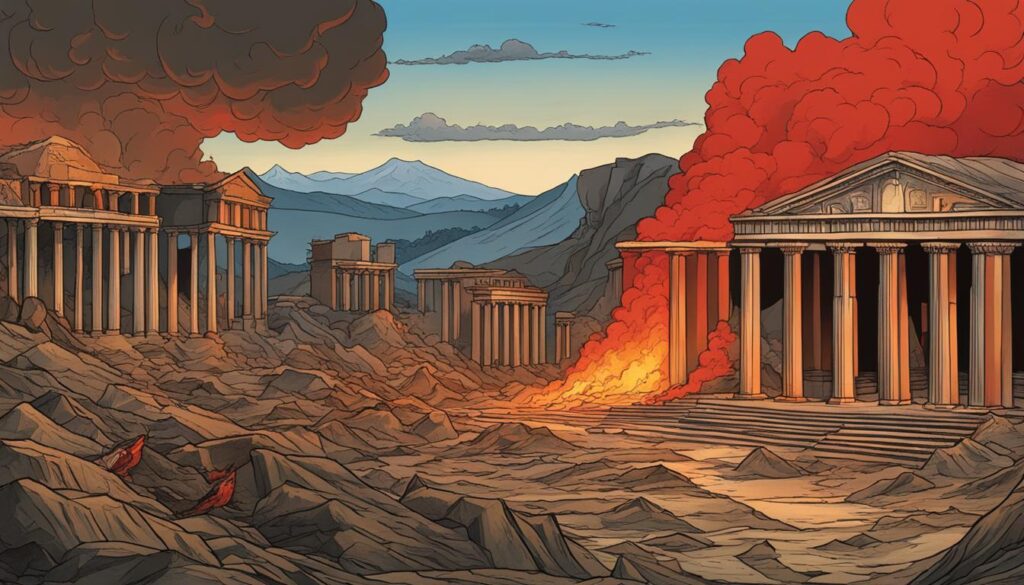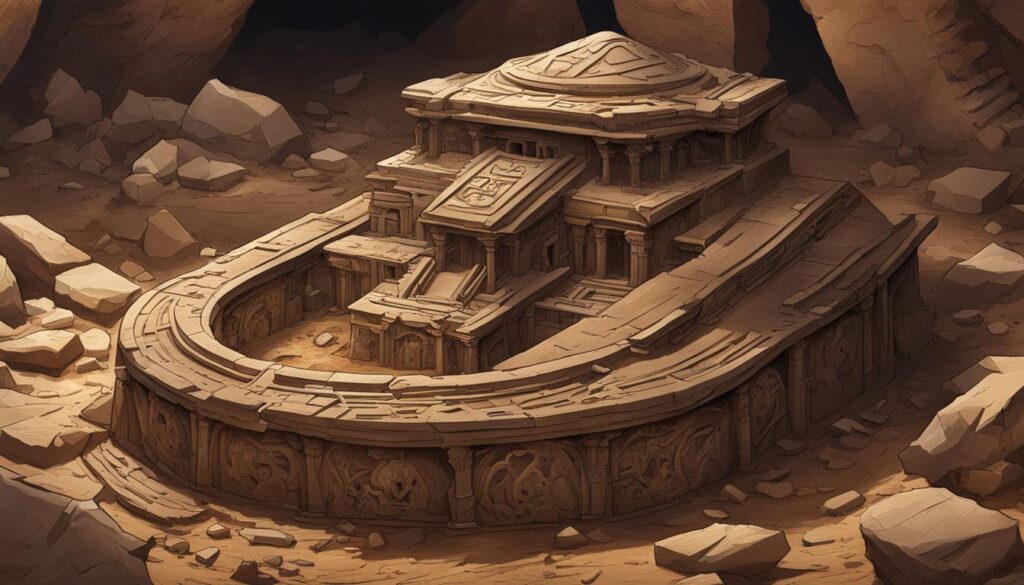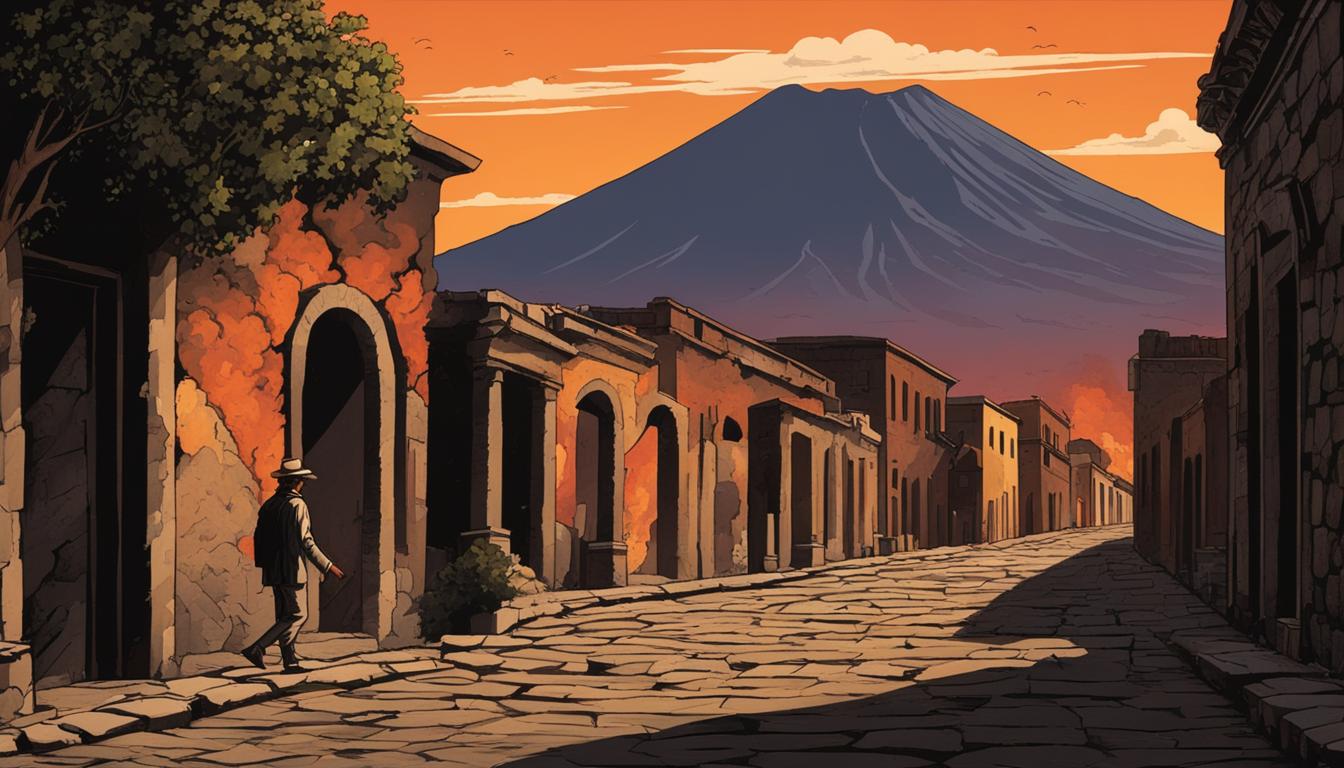Discover the captivating world of ancient Rome in “Pompeii” by Robert Harris. This enthralling historical fiction novel takes readers on a journey back to the events leading up to the eruption of Mount Vesuvius in 79 AD, which famously buried the city of Pompeii and its surroundings under layers of ash and volcanic debris.
Combining elements of history, suspense, and intrigue, “Pompeii” offers a gripping tale that brings ancient Rome to life. Dive into the meticulous research and immersive storytelling of Robert Harris as he weaves a narrative centered around Marcus Attilius Primus, a Roman aquarius (hydraulic engineer) responsible for the Aqua Augusta aqueduct.
As Attilius investigates a diminishing water supply, he uncovers a web of corruption and greed. Along the way, he encounters the wealthy Ampliatus and forms a connection with Corelia, Ampliatus’s daughter. With Mount Vesuvius on the brink of eruption, Attilius must navigate the dangerous situation to save himself and those dear to him.
Key Takeaways:
- Immerse yourself in the world of ancient Rome with the historical fiction novel “Pompeii” by Robert Harris.
- Follow the story of Marcus Attilius Primus, a Roman aquarius, as he unravels a plot of corruption and greed.
- Experience the suspense and danger as Mount Vesuvius threatens to erupt, putting the characters’ lives at stake.
- Explore themes of duty, honor, family, and politics woven throughout the narrative.
- Enjoy a perfect blend of history and fiction, as Robert Harris meticulously incorporates historical accuracy into the compelling story.
The Plot of “Pompeii”
The novel “Pompeii” by Robert Harris takes readers on a captivating journey through ancient Rome, immersing them in the thrilling events leading up to the eruption of Mount Vesuvius in 79 AD. At the center of the plot is Marcus Attilius Primus, a skilled Roman aquarius assigned to the Aqua Augusta, the vital aqueduct responsible for supplying water to the towns in the Bay of Naples region.
As Attilius diligently performs his duties, he notices a troubling decrease in the water supply. Determined to uncover the cause, Attilius delves deeper into his investigation, only to stumble upon a web of corruption and greed. In his quest for the truth, he encounters Ampliatus, a wealthy and conniving individual, and forms a bond with Corelia, Ampliatus’s daughter.
Just as Attilius begins to unravel the sinister plot, the long-dormant Mount Vesuvius springs to life, unleashing its devastating power upon Pompeii and its inhabitants. Amidst the chaos and impending danger, Attilius must navigate the treacherous situation and strive to save himself and those he holds dear.
The plot of “Pompeii” skillfully interweaves the intricacies of Roman society, the mesmerizing aqueduct systems, and the impending catastrophe. Harris’s vivid storytelling and meticulous attention to historical detail make this historical fiction novel a compelling and gripping read.
“As if coming from some long-forgotten wellspring, a sudden and irresistible force compelled him up the stairs and into the street outside. It was as if the volcano’s gods were calling him. And Attilius went, walking towards the final pyrotechnics of his career.”
Throughout the plot, readers are immersed in the world of ancient Rome, witnessing the corruption of the powerful, the pursuit of truth, and the resilience of individuals amidst impending doom.
Historical Context of Pompeii
The eruption of Mount Vesuvius in 79 AD remains a significant event in ancient Roman history. This cataclysmic event resulted in the burial of the cities of Pompeii and Herculaneum under layers of ash and volcanic debris, preserving them in time.
Archaeological excavations of Pompeii have unearthed a wealth of information about the daily life, culture, and societal norms of the ancient Romans. These findings offer invaluable insights into the lives of both the aristocracy and common people of ancient Rome.
Uncovering Pompeii’s Past
The ruins of Pompeii have provided a glimpse into the architectural marvels of the Roman Empire, showcasing well-preserved structures such as residential homes, amphitheaters, and marketplaces. The elaborate frescoes and mosaics adorning the walls of these buildings give us a sense of the artistic finesse and aesthetic sensibilities of the time.
Excavations have also revealed details about the daily activities, occupations, and social hierarchies of the residents of Pompeii. By examining the remains, historians have been able to piece together narratives about the inhabitants’ religious practices, economic activities, and even their dietary preferences.
The Significance of “Pompeii” by Robert Harris
“Pompeii” by Robert Harris takes readers right into this historical period by ingeniously blending real-life events, such as the eruption of Mount Vesuvius, with a gripping fictional narrative. Through the lens of the protagonist, Marcus Attilius Primus, and his encounters with various characters, the novel immerses readers into the complex society, political intrigues, and the impending disaster that shrouded Pompeii.
This blend of fact and fiction offers a unique perspective on the historical context surrounding the eruption and reflects the depth of research undertaken by the author. “Pompeii” not only entertains but also provides an educational experience, transporting readers to ancient Rome and allowing them to witness the events that forever changed the course of history.
The Characters of “Pompeii”
The main characters in the novel include Marcus Attilius Primus, the protagonist and aquarius responsible for the Aqua Augusta; Corelia, the daughter of wealthy landowner Ampliatus; and Ampliatus himself, a manipulative and corrupt individual. Other important characters include Pliny the Elder, a Roman naval commander stationed near Pompeii, and various Roman officials and citizens. Each character plays a crucial role in the development of the plot and the events leading up to the eruption of Mount Vesuvius.
- Marcus Attilius Primus: As a Roman aquarius, Attilius is tasked with maintaining the Aqua Augusta aqueduct. He becomes entangled in the corrupt schemes surrounding the dwindling water supply and must navigate the dangers of Mount Vesuvius erupting.
- Corelia: The daughter of Ampliatus, Corelia forms a connection with Attilius and becomes a pivotal figure in the events leading up to the eruption.
- Ampliatus: A wealthy landowner and a manipulative and corrupt individual, Ampliatus plays a significant role in the plot of “Pompeii.”
- Pliny the Elder: A Roman naval commander stationed near Pompeii, Pliny the Elder provides valuable insights and assistance to Attilius in his quest.
These characters, along with the supporting cast of Roman officials and citizens, bring depth and complexity to the story, immersing readers in the world of Pompeii and the events that unfolded before the catastrophic eruption of Mount Vesuvius.
Themes in “Pompeii”
“Pompeii” explores various themes that are central to the story, including corruption, duty, honor, family, and politics. These themes add depth to the narrative, highlighting the complexities of Roman society and the challenges faced by the characters.
Corruption: The novel delves into the corrupt practices of powerful individuals, such as Ampliatus, who exploit their positions for personal gain. This theme exposes the darker side of society and the consequences of unchecked power.
Duty: Characters like Marcus Attilius Primus exemplify the sense of duty and responsibility that drive their actions. Despite the obstacles they encounter, they remain committed to fulfilling their obligations, showcasing the moral and ethical values of the time.
Honor: The theme of honor plays a significant role in the decisions made by the characters. Their actions are guided by a desire to uphold their personal integrity and maintain their sense of honor, even in the face of adversity.
Family: Family ties are explored throughout the novel, showcasing the importance of familial relationships in Roman society. The characters’ actions are often driven by a desire to protect and uphold the honor of their families, highlighting the deep-rooted values and traditions.
Politics: The political landscape of ancient Rome is intricately woven into the story. The characters navigate the intricate web of political intrigue, showcasing the power dynamics and complexities of Roman politics during this period.
The exploration of these themes adds depth and complexity to “Pompeii,” offering readers a thought-provoking and immersive reading experience.

The Science of Volcanic Eruption
One aspect of “Pompeii” that stands out is the incorporation of scientific details about volcanic eruption. The author, Robert Harris, weaves this information into the plot, drawing from the science of volcanic activity.
The novel explains the potential dangers and impact of volcanic eruptions, highlighting the risks faced by the characters living in the shadow of Mount Vesuvius. As the story unfolds, readers gain insights into the science behind volcanic eruptions, including the build-up of pressure, the release of gases and magma, and the devastating consequences of the eruption.
“The power of Mount Vesuvius is indeed formidable,” Scopas explained as he pointed towards the brooding volcano. “Its eruptions are driven by the mighty forces deep within the Earth. When the pressure becomes unsustainable, the volcano unleashes its fury, showering the surrounding areas with ash, lapilli, and molten rock.”
Furthermore, “Pompeii” explores the connection between the volcanic eruption and the problems with the Aqua Augusta aqueduct. As the Aqua Augusta is vital for the survival of the towns in the Bay of Naples region, the eruption’s impact adds another layer of tension and urgency to the story.
Overall, the incorporation of scientific details in “Pompeii” enhances the authenticity and depth of the narrative, providing readers with a deeper understanding of the science of volcanic eruptions and the catastrophic event that unfolded in ancient Pompeii.
Historical Accuracy in “Pompeii”
While “Pompeii” is a work of fiction, it incorporates historical details and events to create a vivid and accurate depiction of ancient Pompeii. The author, Robert Harris, conducted extensive research to ensure the authenticity of the setting, characters, and historical context. The eruption of Mount Vesuvius, the ruins of Pompeii, and the customs and lifestyle of the ancient Romans are portrayed in a way that stays true to historical records and archaeological findings.
Reception and Reviews of “Pompeii”
“Pompeii” by Robert Harris has garnered positive reception and reviews from readers and critics alike. The novel has been praised for its engaging storytelling, well-developed characters, and meticulous attention to historical detail. Many readers appreciate the blend of history and fiction, finding it to be an immersive reading experience. Additionally, the book has received accolades for its suspenseful narrative and the seamless integration of scientific information.
- Engaging storytelling
- Well-developed characters
- Meticulous attention to historical detail
- Immersive reading experience
- Suspenseful narrative
- Seamless integration of scientific information
To quote a satisfied reader,
“I was captivated by the gripping storytelling and attention to historical accuracy in ‘Pompeii.’ The characters felt real, and I couldn’t put the book down. Harris seamlessly weaves in scientific details about volcanic eruptions, adding an extra layer of depth to the story.”
Film Adaptation of “Pompeii”
A film adaptation of “Pompeii” was planned in 2007, with director Roman Polanski attached to the project. The film, which had a budget of $150 million, aimed to bring the story to the big screen with an all-star cast. However, due to various challenges, including script problems and the looming threat of an actors’ strike, the film was ultimately cancelled. Despite this setback, the popularity of the book continued to grow.
Ongoing Discoveries in Pompeii
Even to this day, new archaeological discoveries continue to be made in Pompeii, providing valuable insights into the lives of its ancient inhabitants. These ongoing excavations at Pompeii, conducted by the dedicated team of experts at the Pompeii Archaeological Park, contribute to our understanding of this once-thriving city and its tragic fate.

In 2020, a significant discovery was made in Pompeii—an excavated fast-food eatery known as a thermopolium. This find revealed fascinating details about the food preferences and dining habits of the Romans in Pompeii. It provided a glimpse into the bustling culinary scene of the ancient city and the range of food options available to its residents.
“The excavation of the thermopolium in Pompeii’s Regio V offers us important insights into the daily lives of the ancient Romans. The well-preserved remains of food and drink that were found there allow us to better understand the habits and tastes of the city’s inhabitants.” – Dr. Massimo Osanna, Director-General of the Pompeii Archaeological Park
These ongoing discoveries highlight the significance of the Pompeii Archaeological Park as a treasure trove of archaeological finds. The park’s team of experts tirelessly works to uncover artifacts, frescoes, and architectural remains that provide glimpses into the daily life, culture, and artistry of ancient Pompeii.
As each new discovery unfolds, it adds another piece to the complex puzzle and deepens our understanding of this ancient city’s history. These excavations serve as a reminder of both the tragic event that buried Pompeii and the resilience of its people.
Legacy of “Pompeii”
“Pompeii” by Robert Harris has left a lasting legacy in the genre of historical fiction. The novel has been widely acclaimed for its meticulous research, compelling storytelling, and immersive depiction of ancient Rome. With its blend of historical accuracy and fictional narrative elements, “Pompeii” has become a standout work in the genre.
Readers have praised the book for its ability to transport them to the ill-fated city of Pompeii, allowing them to experience the events leading up to the volcanic eruption of Mount Vesuvius. The attention to detail and immersive storytelling have gained “Pompeii” a dedicated readership that continues to recommend the book as a gripping and informative read.
The legacy of “Pompeii” extends beyond its literary success. The novel has sparked interest and curiosity in the history of Pompeii and ancient Rome, encouraging readers to explore further and delve deeper into this fascinating era. Its influence has also been felt in the realm of historical fiction, inspiring other authors to explore similar themes and settings.
“‘Pompeii’ is a masterpiece of historical fiction that seamlessly blends the factual with the fictional. Harris’s attention to detail and his ability to bring the ancient world to life is unparalleled. This book will transport you to another time and place, leaving you spellbound.” – Historical Fiction Enthusiast
As the legacy of “Pompeii” lives on, it continues to captivate readers and ignite their interest in the ancient world. It stands as a testament to the power of historical fiction in educating, entertaining, and inspiring readers to delve into the rich tapestry of the past.
Recommended Reading for History Enthusiasts
For readers interested in delving into the fascinating world of Roman history and historical fiction, there are several noteworthy works that offer captivating insights into this ancient civilization. One highly recommended book is “Pompeii” by Robert Harris. With its engaging storytelling, meticulous attention to historical context, and accurate depiction of ancient Rome, it is sure to captivate and transport you to the ill-fated city.
Another notable work in the genre is “I, Claudius” by Robert Graves. This gripping historical fiction novel brings to life the tumultuous reign of Emperor Claudius, offering a fascinating perspective on the political intrigues and power struggles of ancient Rome.
For those interested in a broader exploration of Roman history, “Ancient Rome: The Rise and Fall of an Empire” by Simon Baker is an excellent choice. This comprehensive book provides an insightful overview of Rome’s journey from its humble beginnings to its eventual decline, covering key events and influential figures throughout its history.
The fascinating world of Roman history and historical fiction awaits, offering captivating insights into this ancient civilization.
Finally, if you are seeking a more personal and immersive account of life in ancient Rome, “Mediterranean Summer” by David Howarth provides a vivid portrayal of the culture and daily life of the Roman Empire. Through the eyes of Marcus, a young sailor, the reader is transported to the bustling streets of Rome and the vibrant ports of the Mediterranean.
These recommended readings offer a diverse and captivating glimpse into the rich tapestry of Roman history. Whether you are a history enthusiast or simply curious about ancient civilizations, these books are sure to satisfy your thirst for knowledge and provide hours of immersive reading.

Conclusion
“Pompeii” by Robert Harris is a mesmerizing book that seamlessly blends historical events with fiction, immersing readers in the ill-fated city of Pompeii during the ancient Roman era. Through meticulous research and captivating storytelling, Harris brings to life the events that led to the eruption of Mount Vesuvius, weaving a tale of corruption, duty, honor, family, and politics.
This book summary serves as a tantalizing overview for those who wish to delve into the gripping tale of Pompeii. With its rich portrayal of ancient Rome and its incisive exploration of timeless themes, “Pompeii” offers an enthralling reading experience that will leave you wanting more.
If you are fascinated by history and enjoy the immersive world of historical fiction, “Pompeii” by Robert Harris should definitely be on your reading list. This book’s meticulous attention to detail and its ability to transport readers to a bygone era make it a truly remarkable and worthwhile read. Discover the secrets of Pompeii and experience the dramatic events surrounding its tragic demise in this captivating book.
FAQ
What is "Pompeii" by Robert Harris about?
“Pompeii” is a historical fiction novel that explores the events leading up to the eruption of Mount Vesuvius in 79 AD, which buried the city of Pompeii and its surrounding areas. The book combines elements of history, suspense, and intrigue to create a gripping tale set in ancient Rome.
Who is the main character in "Pompeii"?
The main character in “Pompeii” is Marcus Attilius Primus, a Roman aquarius responsible for the Aqua Augusta, the aqueduct that supplies water to the towns in the Bay of Naples region. He uncovers a plot involving corruption and greed while investigating the diminishing water supply.
What are the major themes in "Pompeii"?
“Pompeii” explores themes of corruption, duty, honor, family, and politics. The novel delves into the corrupt practices of powerful individuals, the sense of duty felt by the characters, the role of honor in decision-making, and the impact of family ties and political intrigue.
Is "Pompeii" historically accurate?
While “Pompeii” is a work of fiction, it incorporates historical details and events to create a vivid and accurate depiction of ancient Pompeii. The author, Robert Harris, conducted extensive research to ensure the authenticity of the setting, characters, and historical context.
How has "Pompeii" been received by readers and critics?
“Pompeii” has garnered positive reception and reviews from readers and critics alike. The novel has been praised for its engaging storytelling, well-developed characters, and meticulous attention to historical detail. Many readers appreciate the blend of history and fiction, finding it to be an immersive reading experience.
Was there a film adaptation of "Pompeii"?
Yes, there were plans for a film adaptation of “Pompeii” in 2007, with director Roman Polanski attached to the project. However, due to various challenges and setbacks, including script problems and the looming threat of an actors’ strike, the film was ultimately cancelled.
Are there ongoing archaeological discoveries in Pompeii?
Yes, even to this day, new discoveries are being made in Pompeii. The Pompeii Archaeological Park and its dedicated team of experts continue to uncover artifacts and insights that contribute to our understanding of this ancient city and its tragic fate.
What is the legacy of "Pompeii" in the genre of historical fiction?
“Pompeii” by Robert Harris has left a lasting legacy in the genre of historical fiction. The novel has been widely acclaimed for its meticulous research, compelling storytelling, and immersive depiction of ancient Rome. It has gained a dedicated readership and continues to be recommended as a gripping and informative read.
What other books are recommended for history enthusiasts?
For readers interested in Roman history and historical fiction, “Pompeii” by Robert Harris is highly recommended. Other notable works in the genre include “I, Claudius” by Robert Graves, “Mediterranean Summer” by David Howarth, and “Ancient Rome: The Rise and Fall of an Empire” by Simon Baker.



